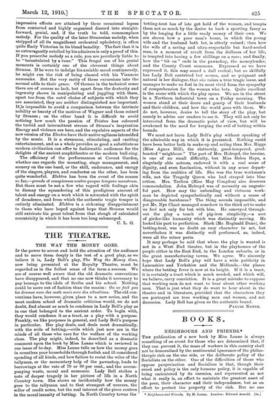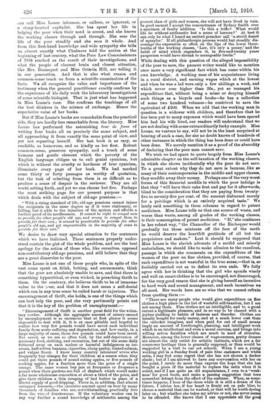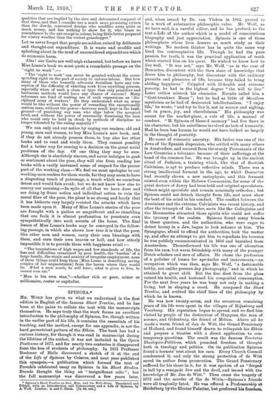BOOKS.
NEIGHBOURS AND FRIENDS.•
THE publication of a new book by Miss Loane is always something of an event for those who are determined that, if they can prevent it, the mass of workers in this country shall not he demoralised by the sentimental ignorance of the philan- thropic rich on the one side, or the deliberate policy of the Socialists on the other. One of the difficulties of those who oppose pauperisation and Socialism is that, though their creed and policy is the only humane policy, it is capable of being caricatured by its enemies, and represented as not what it really is, an effort to maintain the greatest asset of the poor, their character and their independence, but as an effort to protect the property of the rich. But no one • Neighbours and Friends. By X. Lonna. London : Edward Arnold. [68.]
zap. call Miss Loane inhuman, or callous, or ignorant, or a stony-hearted capitalist. She has spent her life in helping the poor when their need is sorest, and she knows the working classes through and through. She sees the life of the poor steadily and she sees it whole. And from this first-hand knowledge and wide sympathy she tells us almost exactly what Chalmers told the nation at the beginning of last century, what the Poor Law Commissioners of 1834 reached as the result of their investigations, and what the people of clearest brain and closest attention, like Mrs. Bosanquet and Miss Octavia Hill, are telling it in our generation. And that is also what reason and common-sense teach us from a scientific examination of the facts. We all recognise the value and importance of the testimony when the general practitioner exactly confirms by the experience of his daily work the laboratory investigations of some scientific biologist. That is just what has happened in Miss Loane's case. She confirms the teachings of all the best thinkers in the science of exchange. Hence the superlative value of her books.
But if Miss Loane's books are remarkable from the practical side, they are hardly less remarkable from the literary. Miss Loane has performed the astonishing tour de force of writing four books all on precisely the same subject, and all approaching it from exactly the same point of view, and yet not repeating herself. Her last book is as racy, as readable, as humorous, and as kindly as her first. Robust
common-sense, generous sympathy, and a touch of some humane and gentle element which the poverty of the English language obliges us to call genial cynicism, but which is without the cruelty or hardness of true cynicism, illuminate every page of her book. We had marked some thirty or forty passages as worthy of quotation, but the task of selecting from them is so difficult as to produce a sense of despair in the reviewer. They are all worth setting forth, and yet we can choose but five. Perhaps the most striking page for our present purpose is that which deals with the subject of old-age pensions :—
" With a rising standard of life, old age pensions cannot injure the recipients in the same degree as if it were stationary, or falling, but it adds to the injustice of the system and affords a further proof of its needlessness. It cannot be right to compel men. to provide for other people's old age, and wrong to compel them to provide for their own ; it cannot be practicable to provide for other people's old age, and yet impracticable in the majority of cases to provide for their own."
We desire to draw very special attention to the sentences which we have italicised. These sentences properly under- stood contain the gist of the whole problem, and are the beat apology for the action of those who, like ourselves, opposed non-contributory old-age pensions, and still believe that they are a great disservice to the poor.
Miss Loane is not one of those people who, in spite of the vast sums spent on drink, betting, and amusements, think that the poor are absolutely unable to save, and that there is something hypocritical, or even wicked, in preaching thrift to them. On the contrary, she believes thrift to be of immense value to the and that it does not mean a self-denial
which can in any true sense be called harsh or injurious. The encouragement of thrift, she holds, is one of the things which can best help the poor, and she very pertinently points out that it is the key of the problem of unemployment:— "Encouragement of thrift is another great field for the volun- tary worker. Although the aggregate amount of misery caused by unemployment is so enormous that at first glance it seems impossible to deal with it, it is at once pitiable and hopeful to realise how very few pounds would have saved each individual family from acute suffering and degradation, and how easily, in a large majority of cases, those few pounds could have been saved. Not saved, as we are so often told, by the self-deprivation of necessary food, clothing, and recreation, but out of the sums daily frittered away on such useless or harmful indulgences as ice- cream, half-rotten bananas, cigarettes, cheap pastry, tinned salmon, and vulgar finery. I know many country labourers' wives who frequently buy oranges for their children at a. season when they could get three pounds of sound eating apples, or five pounds of cooking apples, for a fraction more than the price of a single orange. The same women buy jam at fourpence or fivepence a pound when their gardens are full of rhubarb which would make a far more wholesome concoction at about a third of the price, and give their children a thin scraping of bad butter in place of a liberal supply of good dripping. There is, in addition, that almost untapped resource,—the excessive amount spent on beer by many thousands of families who are, notwithstanding, practically free from the vice of drunkenness. If the voluntary worker can in any way further a sound knowledge of arithmetic among the
poorest class of girls and women, she will not have lived in vain. In good earnest I accept the remonstrance of Sydney Smith over a specimen of faulty addition. Is this a trifle ? What would life be without arithmetic but a scene of horrors ? ' At best it can only be what I heard an excited preacher 'a aterid desert of squaylor.' If all philanthropic persons would bnt steadily dis- courage the expression so often on the lips of the lower three- tenths of the working classes, Law, it's on'y a penny,' and the habit of mind which engenders it, in five-and-twenty years pauperism would have shrunk to manageable limits."
While dealing with this question of the alleged impossibility of the poor to save, the present writer would like to mention once more a very significant fact which has come within his own knowledge. A working man of his acquaintance living in a rural district, and earning wages which at the lowest and when he was a lad were only a few shillings a week, and which never rose higher than 26s., yet so managed his expenditure that, without being a miser or denying himself such things as a bicycle and books—he has a collection of some two hundred volumes—he contrived to save the equivalent of £300. When we add that the working man in question is a widower with children, and therefore that he has been put to many expenses which would have been spared him had his wife lived, our readers will understand that we are not dealing with some extraordinarily lucky example. Miss Loane, we venture to say, will not be in the least surprised at hearing of such a case, for she no doubt knows of hundreds of other instances in which the thing has been done or could have been done. We merely mention it as a proof of the absurdity of declaring that the poor man cannot save.
We wish we had space to quote largely from Miss Loane's admirable chapter on the self-taxation of the working classes, in which she shows incidentally why the poor do not save. To a great extent why they do not save is because, like so many of their contemporaries in the middle and upper classes, they muddle away their money. Perhaps one of the very worst forms of this financial muddle in which the poor indulge is that they " will have their cake first and pay for it afterwards, blind to the consideration that they are paying from twenty- five to seventy-five per cent. of the amount disbursed merely for a privilege which is an entirely acquired taste." We lately said something in these columns in regard to patent medicines. Miss Loane tells us that one source of waste, and worse than waste, among all grades of the working classes, is their consumption of patent medicines. " If," she continues in her robust way, " the Chancellor of the Exchequer would gradually tax these mixtures off the face of the earth he would deserve the heartfelt gratitude of all but the proprietors and makers." Lest it should be supposed that Miss Loane is the slavish advocate of a sordid and miserly materialism, we should like to make allusion to the excellent, passage in which she comments on the expenditure of the women of the poor on fine clothes, provided, of course, that such expenditure is not wasteful in the true sense,—that is, so foolishly carried out as to defeat its own ends. We fully agree with her in thinking that the girl who spends wisely and well on smart clothes is to be encouraged, not discouraged, for the very,good reason that she is giving herself an incentive to hard work and sound management, and such incentives we all need. Her words here are so wise that we cannot refrain from quoting them :— " There are many people who would give expenditure on fine clothes a high place on the list of wasteful self-taxation, but I am not among them. Fine clothes are an intelligible, and to a great extent a legitimate pleasure, and in no way to be classed with a joyless yielding to habits of laziness and disorder. Clothes are usually bought for ready money, and at a much lower cost than the onlooker imagines, and when paid for out of small means imply an amount of forethought, planning, and intelligent work which is an intellectual and even a moral exercise, and brings into willing action faculties which are much in need of stimulus. 4oreoveri among the lower classes of wage-earners, pretty dresses are almost the only outlet for artistic instincts, which are a far commoner heritage than is generally supposed, or than would be suggested by a visit to our art schools. When I see a young working girl in a Sunday frock of pale blue cashmere and white satin, I may feel some regret that she has not chosen a darker shade ; but if I am allowed to have any conversation with her on the point, I rarely do more than express the hope that she has bought a piece of the material to replace the satin when it is soiled, and if I am quite an old acquaintance, I own to a weak- ness' for good boots, and make a passing suggestion that here somewhat detract from the effect of the costume. When, as Saill(3-. times happens, I hear of the dress while it is still a dream of the future, I advise her, if her heart is firmly set on pale blue, to choose a material that can be washed, or that will be worth dyeing later on ; but whether she takes my advice or not, she never seem to be offended. She knows that I can appreciate all the good
qualities that are implied by the slow and determined conquest of that dress, and that I consider her a much more promising citizen than the dowdy, contented drudge who muddles away quite as much money, and has nothing to show for it, who bears no resemblance to the ant except in colour, being little better prepared for wintry weather than the veriest grasshopper."
Let us never forget that people are seldom ruined by deliberate
and thought-out expenditure. It is waste and muddle and splashing about in the mud of unconsidered expenditure which do economic harm.
Alas ! our limits are well-nigh exhausted, but before we leave Miss Loane's book we must quote a remarkable passage on the right to work " :—
" The 'right to work' can never be granted without the corre- sponding right on the part of society to enforce labour. But how many of those who honestly advocate Socialism have any con- ception of the difficulty of exacting work from unwilling persons, especially when of such a class or type that only primitive and barbarous methods would have any chance of success ? Many reformers are fond of making use of such expressions as dis- ciplined army of workers.' Do they understand what an army would be like without the power of rewarding the exceptionally zealous man, without the power—however much kept in the back- ground—of punishing any man who slips below the accepted level, and without the power of summarily dismissing the man who could only be held in check by methods of discipline no longer tolerated by the ruling majority ?"
We can only end our notice by urging our readers, old and young, men and women, to buy Miss Loane's new book, and, if they do not already possess them, to buy also her other books and to read and study them. They cannot possibly find a better way for coming to a decision on the great social
problems of the day. Of one thing they may be sure. Although she is absolutely sincere, and never indulges in gush or sentiment about the poor, they will rise from reading her books with a vastly increased sense of respect for the poorer part of the working class.—We feel we must apologise to our working-men readers for these words, for they may seem to have a disgusting touch of patronage, a touch which we ourselves detest and would fain avoid; but we do not know how else to convey our meaning.—In spite of all that we have done and are doing by State action and individual action to ruin the moral fibre of the poor, the plant is so strong and hardy that it has hitherto very largely resisted the attacks which have been made upon it. Many of Miss Loane's stories of the poor are fraught with a pathos so magnificent and so ennobling that one feels it is almost profanation to penetrate even sympathetically into such secrets of the home. The final
lesson of Miss Loane's books may be conveyed in the follow- ing passage, in which she shows how true it is that the poor, like other men and women, carry their own blessings with them, and earn their own heaven or hell, and how utterly impossible it is to provide them with happiness retail :— " The temptations of high wages and low standards of life, the loss and difficulties occasioned by poor health, the burden' of a largo family, the strain and anxiety of irregular employment, none of these things could keep them [Miss Loane is describing saving couples of her acquaintance] from the haven where they would be. What a man wants, he will have ; what is given to him, he cannot even use."
"Man is his own star,"—whether rich or poor, miner or millionaire, coster or capitalist.
















































 Previous page
Previous page